Sleep loss leads to anxiety, poor food choices

Two studies presented at a meeting in Boston this week by researchers at UC Berkeley’s Sleep and Neuroimaging Laboratory, which is headed by Matthew Walker, associate professor of psychology and neuroscience, unveiled further evidence about the dangers of too little sleep.
In one study, fMRI scans on 18 healthy adults produced results that suggest that, when sleep deprived, the emotional centers of the brain trigger emotional dysfunction and risk. And the more naturally anxious a person is, the more vulnerable he or she is to the effects of lack of sleep. Andrea Goldstein, a graduate student at the lab, was the lead author of the study, “Tired, anxious and expecting the worst: The impact of sleep deprivation and anxiety on emotional brain anticipation.”
The second study used MRI scans on 23 healthy adults to show how sleep deprivation impairs regions of the brain where food choices are made. Lack of sleep significantly impaired the frontal lobe, which controls behavior and decision-making. Lead author Stephanie Greer, another graduate student in the lab, said the study, “MRI scans show how sleep loss affects the ability to choose proper foods,” may help shed light on the link between sleep loss and obesity.
The abstracts were presented at SLEEP 2012, the 26th annual meeting of the Associated Professional Sleep Societies.
